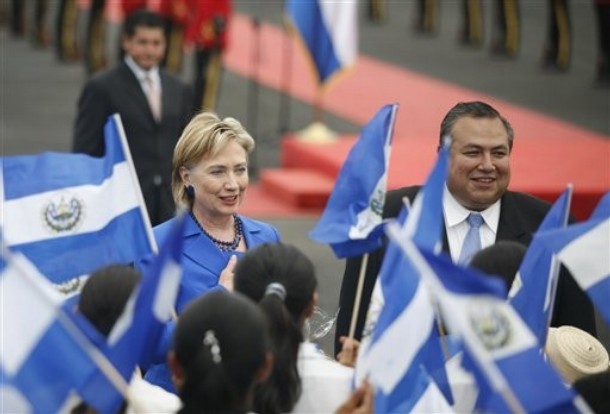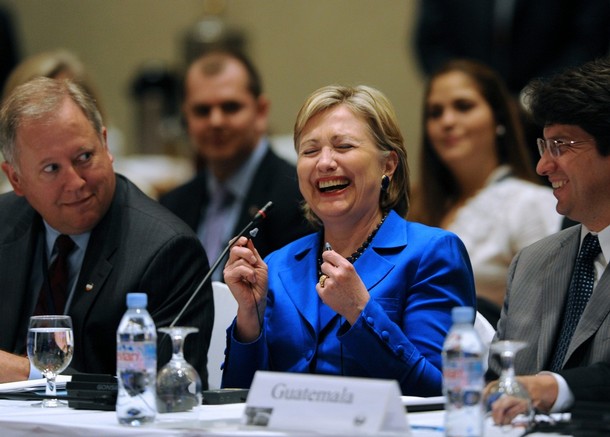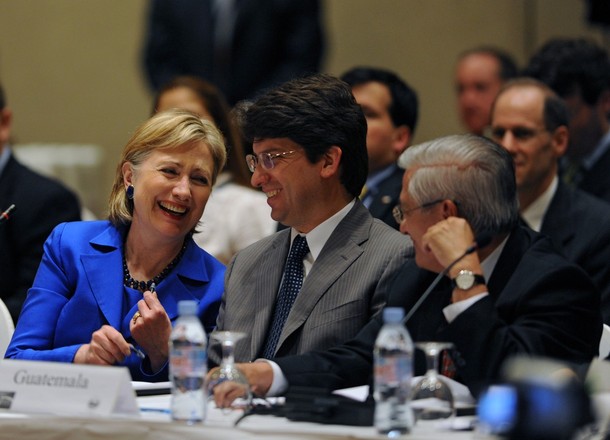Thank
you. I am delighted to be with you today and I feel privileged to be in
El Salvador at this historic moment for the Salvadoran people. The
transfer of power that we will witness tomorrow exemplifies the progress
that has occurred throughout our hemisphere during the past two
decades. This gathering – which is being co-hosted by two parties who
were once at war – is hard evidence of the strength and durability of
democracy and the promise it holds not only for this country, but for
our region. The United States is grateful for the productive
relationship we have had with El Salvador during President Saca’s time
in office, and we are looking forward to similarly strong cooperation
and friendship with the government of President-elect Funes.
In El
Salvador and throughout the region, we are focused not on old battles
but on new partnerships that improve lives, advance democratic
principles, and promote the common good – and we seek to work in a
spirit of mutual respect with those who share our goal to make the
Americas more peaceful and more prosperous.
President Obama has
emphasized that it's not important whether ideas come from one party or
another, so long as they move us in the right direction. This meeting
builds on the work of the previous U.S. administration, but the
President and I are also committed to re-launching Pathways to
Prosperity, and expanding its work to spread the benefits of economic
recovery, growth, and open markets to the most vulnerable and
marginalized citizens of our region.
To achieve the shared
prosperity we seek, we must integrate our commitment to democracy and
open markets with an equal commitment to social inclusion.
Rather
than defining economic progress simply by profit margins and GDP, our
yardstick must be the quality of human lives, whether families have
enough food on the table; whether young people have access to schooling
from early childhood through university; whether workers earn decent
wages and have safe conditions at their jobs; whether mothers and
fathers have access to medical care for themselves and their children so
that children dying before adulthood is a rarity, not an accepted fact;
and whether every person who works hard and takes responsibility has
the promise of a brighter future.
The global financial crisis has
reinforced how closely our economies are linked – if there was any doubt
before, there should be none now. We know that commerce between our
nations is and will be a crucial part of our economic recovery. And that
trade should be an integral part of our national development
strategies. Achieving the type of broad-based prosperity that citizens
of the Americas deserve and demand will require us to harness the
talents of all our citizens.
Pathways to Prosperity can and will
help spread the benefits of economic engagement and trade to women,
rural farmers and small businesses, Afro-descendents, indigenous
communities, and others too often left on the sidelines of progress.
To succeed, we must:
- Set concrete goals;
- Broaden the scope and the impact of our efforts; and
- Develop a plan with mile markers that will allow us to assess our progress.
The
14 Pathways countries represent 34 percent of the world’s GDP – we know
how to get things done. Our work within this partnership should focus
on achieving tangible results. We all need to be in what I call the
solutions business.
We already have examples of cooperation on
trade and development producing real progress for our citizens. In
Honduras, the Food for Progress program found new markets for the
potatoes grown by 1,400 small farmers.
As a result, the farmers’
sales doubled, and they increased their average annual income from less
than $800 to $2,100. In Peru, the Micro and Small Enterprise
Facilitation Program has helped more than 80 municipalities implement
new regulations for business creation. They’ve cut business registration
time by 80% and reduced costs by more than half. In Chile,
collaborative work to satisfy trade and sanitary regulations allowed
small farmers to take advantage of the season difference between the
northern and southern hemispheres, and secure new markets for
strawberries and other summer crops in the U.S. and Canada. We’ve also
seen successful efforts to protect labor rights. And our newest trade
initiatives, like Peru’s Free Trade Agreement with the United States,
have been designed to encourage good environmental stewardship.
The
farmers, small businesses, and workers that benefit from these programs
know the difference between rhetoric and results. We need to build on
these successes, and ensure that all citizens of our hemisphere can
share in the benefits of economic engagement and social equity.
For
Pathways, this will mean expanding beyond our current focus and our
current membership. We should work to promote educational exchanges and
language training programs to harness the power of underprivileged youth
and lay the foundation for regional cooperation among future
generations. We should provide technical assistance to rural businesses
and others who lack easy access to global markets. I hope we will supply
women entrepreneurs with mentors, training, and other tools for
success, as the United States is planning to do through its Pathways
Envoys program. We can expand the availability of microcredit loans.
And
Pathways should be open to working with new partners including other
nations and sub-regional banks that share our commitment to open markets
and greater social inclusion. I want to note the presence of the
observer countries – Brazil and Trinidad and Tobago – that are here
today. Going forward, I hope you and other countries from our hemisphere
will join us in this initiative as full members.
The Americas are
becoming more connected and more dynamic. As this trend continues, our
region will need to provide greater leadership on a broad array of
global issues. Pathways is one example of the kind of multilateral
partnership that can help address the complex challenges of the 21st
century.
Today, in El Salvador, let us look back and acknowledge
the progress we have made in building democracy and peace throughout our
region. But let us also embark together down a new path defined by
shared responsibilities, shared opportunities, and a commitment improve
the life of every citizen in the Americas. We are part of the same
family, this continent is our common home, and we will inhabit a common
future. Let us do all we can to harness the untapped human potential
that covers this vast hemisphere.





